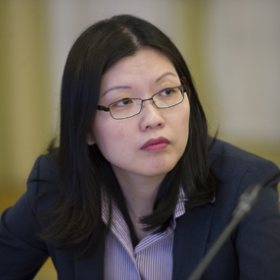
U.S.-China High Level Security Dialogue
From July 18 to 22, 2011, the EastWest Institute (EWI) led a delegation of senior U.S. experts to Beijing for talks with Chinese officials, scholars, and military representatives as part of its 5th U.S.-China High Level Security Dialogue.
The main purpose of the dialogue was to explore concrete ways to increase strategic trust between the United States and China. During the talks, participants addressed a number of critical concerns in U.S.-China relations, including Taiwan, the South China Sea, U.S.-China military-to-military relations, and cybersecurity.
The U.S. delegation consisted of the following members (listed in alphabetical order):
- Joel H. Cowan, member of EWI’s Board of Directors
- David J. Firestein, EWI Vice President for the Strategic Trust-Building Initiative and Track 2 Diplomacy
- Eugene E. Habiger, former Commander in Chief of U.S. Strategic Command
- Piin-Fen Kok, Senior Associate for EWI’s China Program
- T. Michael Moseley, EWI’s Perot Distinguished Fellow and former Chief of Staff of the United States Air Force
- John Edwin Mroz, President and CEO of EWI
- Jonathan D. Pollack, Senior Fellow at The Brookings Institution’s John L. Thornton China Center
- Karl Rauscher, EWI’s Chief Technology Officer
- Daniel M. Slane, Founder and Co-owner of The Slane Company
- Timothy P. Stratford, former Assistant U.S. Trade Representative
Organized in conjunction with the China Institute of International Studies (CIIS), the think tank of China’s Ministry of Foreign Affairs, the week-long dialogue began with three days of discussions with: Chinese experts hosted by CIIS; experts from the China Reform Forum (CRF), a non-profit policy research organization officially affiliated with the Party School of the Communist Party of China (CPC); and military officials and experts hosted by the National Defense University of the People’s Liberation Army (NDU-PLA).
Following these exchanges, the U.S. delegation then met with a number of Chinese and U.S. government officials, including: Minister Wang Yi of the State Council Taiwan Affairs Office; Vice Minister Liu Jieyi of the CPC’s International Department (IDCPC); Assistant Minister Yu Jianhua of the Ministry of Commerce; Director Li Wufeng, head of the State Council Information Office’s Internet Affairs Bureau; and Dr. Robert S. Wang, Chargé d'Affaires of the U.S. Embassy in Beijing. The delegates also visited several Chinese think tanks and companies: the Chinese Academy of Social Sciences Institute of Taiwan Studies; the China Institutes of Contemporary International Relations (CICIR); and Horizon Research Consultancy Group, a public opinion polling firm.
During the weeklong dialogue, participants recognized Taiwan as the main potential flashpoint in U.S.-China relations, and much of the Taiwan-centered discussions focused on U.S. arms sales to Taiwan. Both the U.S. and Chinese delegates agreed that new approaches are needed to prevent increased friction over this issue, which affects both the overall U.S.-China relationship and specifically the military-to-military relationship. To a larger degree, the discussions focused on whether it is possible to achieve a balanced approach that takes into consideration China’s core interests, U.S. commitments and objectives, and Taiwan’s security concerns.
On the military-to-military relationship, participants noted that U.S.-China military contacts are often the first to be suspended when one country wants to express displeasure with the other’s policies or actions. However, both sides agreed that it is precisely when friction arises that maintaining the relationship—and thus the channels of communication—between the two militaries becomes even more important. To strengthen the relationship, participants recommended more operational and technical collaboration between the U.S. and Chinese militaries on common challenges, such as increasing cooperation in joint relief and humanitarian aid efforts. Delegates also stressed that it is important for both political and military leaders in the two countries to recognize the value of maintaining the military-to-military relationship, and that both countries should agree on an appropriate strategy for developing this relationship.
On the South China Sea issue, participants noted that differences between the United States and China are rooted in both legalities and politics. Some delegates recommended that the United States ratify the United Nations Convention on the Law of the Sea (UNCLOS), which would be a useful first step in addressing the legal differences. Politically, both countries need to recognize the broader historical and strategic backdrop affecting their relations with each other and with Southeast Asian nations over the South China Sea tensions. In addition, a focus on U.S.-China shared interests in the South China Sea, such as the importance of securing and maintaining shipping routes, would help to mitigate and prevent continued rifts on the issue.
There’s a need for a similar focus on common interests in dealing with the cybersecurity challenge. While mutual concerns were discussed, including China’s reservations about the new U.S. cybersecurity strategy, dialogue participants agreed that no single country is able to ensure security in cyberspace on its own, and thus cooperation between the United States and China is critical. Both delegations reported their countries as targets of frequent hacking attacks and stressed that identifying and preventing such attacks—including attacks on critical infrastructure—would require joint efforts. Delegates welcomed the prospect of U.S.-China collaboration to establish common norms and terms of references for cyberspace, and a possible first step could be an in-depth analysis of the similarities and differences between U.S. and Chinese cyber doctrines.
Other topics discussed during the dialogue included:
- Impact of recent developments in the Middle East and Southwest Asia on U.S.-China strategic relations;
- Perceptual barriers to U.S.-China economic relations and ways to overcome these obstacles;
- U.S.-China cooperation in nuclear and space security.
Overall, through the dialogue, Chinese and American participants clarified their respective concerns, enhanced their understanding of one another’s policy positions, and explored policy options for achieving progress on some of the most critical and timely issues affecting China-U.S. strategic trust. These positive outcomes were achieved, according to participants, as a result of a higher level of candor in this round of discussions than in previous years.

